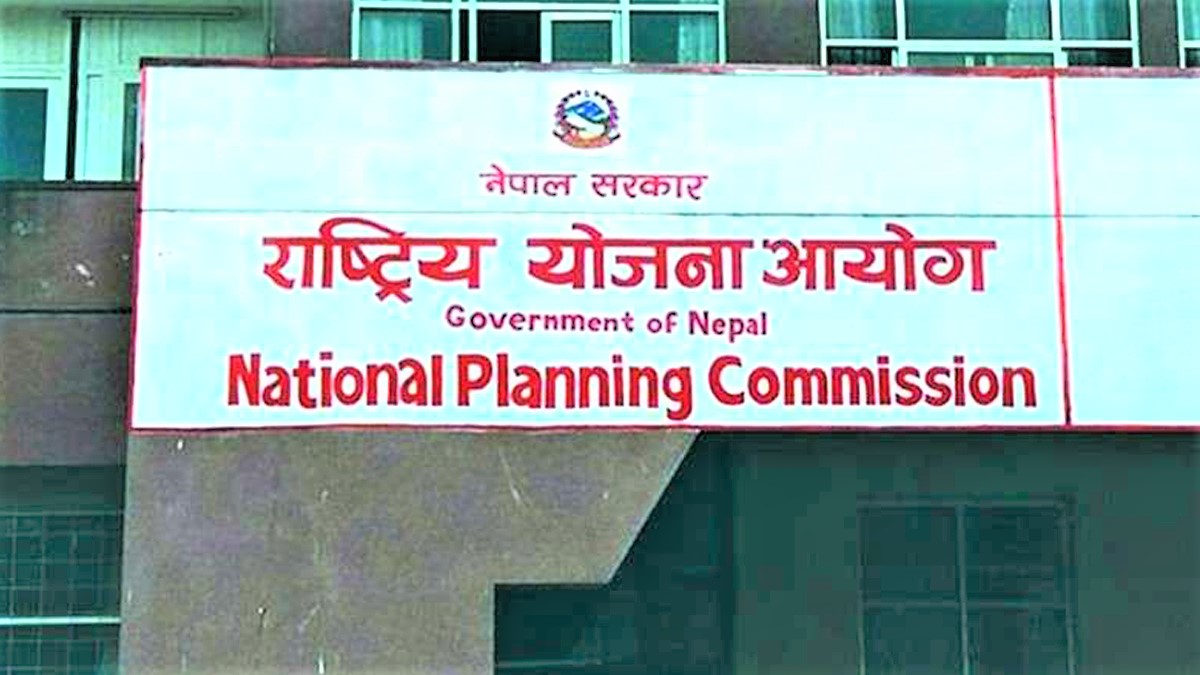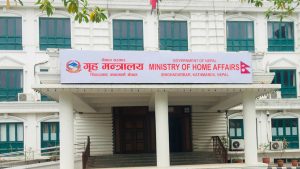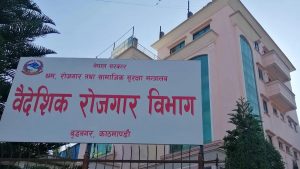
Approach Paper of Sixteenth Plan emphasizes on good governance, social justice and prosperity

The Approach Paper of the Sixteenth Plan (Fiscal Year 2024/25-2028/29) has been prepared with the slogan- ‘good governance, social justice and prosperity’. The full meeting of the National Planning Commission on August 2 has endorsed the approach paper.
The Sixteenth Plan aims to keep good governance in political, administrative and judiciary sectors while maintaining social justice in health, education, employment and housing. It also aims to achieve prosperity in social life, economic development and national economy. The new Periodic Plan has set a strategy of achieving good governance, social justice and prosperity through the structural transformation by identifying, addressing and resolving structural obstacles surfaced in development activities.
“Regarding the implementation of the Plan, a strategy will be developed to consolidate the interrelation and functional efficiency of the concerned bodies of all levels and parties, and make and develop policies based on research and facts,” according to the approach paper. Similarly, the plan has included the area and the strategy of structural transformation.
“For strengthening the whole economic base, the primary sector will be consolidated, the secondary sector developed and expanded, and the service sector stabilized,” reads the paper, “While expanding the base and scope of revenue, a predictable financial system will be developed. Similarly, inclusive mobilization will take place and the external sector shall be stabilized while concentrating financial resources on production and employment generation.”
To increase production and productivity, a policy has been adopted to ensure a timely, quality and cost-effective supply system of all sorts of resources and means of production. Similarly, the production and deployment of knowledge, skills, capacity and energetic human resources have been stressed. The strategy of structural transformation includes the adoption of the latest technology and management methods based on research and development, and the creation of decent, productive and inclusive job opportunities.
A policy will be taken to run the national skill development and employment programme in collaboration with the private sector, and the government and non-governmental sector. For entrepreneurship oriented self-employment, the approach paper includes assistances in the initial capital investment and the mobilization of remittances received from foreign employment, knowledge, skills and technology in the productive sector along with making available vocational training.
Inclusive employment will be promoted through the empowerment of marginalised classes and communities as well as positive discrimination, and domestic workers prioritized in the domestic labour market by regulating migrant workers.
It has a plan of building human capitalisation and efficient human resources. “Through the proper utilisation of demographic dividends at all three levels, federal, provincial and local, employment opportunities will be created at home by producing skilled and efficient human resources,” says the approach paper. “For foreign employment, a strategy has been developed to identity the new destination countries that have safety records and high returns, and reach a labour contract accordingly.”
A quality, equitable and life skills education policy will be taken. “A policy will be taken to manage technology-mediated teaching and learning process at all levels, and laboratories and multidisciplinary libraries. Secondary education will be promoted and developed, and higher education will be connected with entrepreneurship and employment. Similarly, the concept of learning while studying and vice-versa will be effectively implemented.”
The approach paper has emphasised the equitable and compulsory distribution of scholarships to the poor and hardworking students through the one-door system. To help contribute to the physical, mental and intellectual development of students, a policy will be devised to implement the education system based on yoga, meditation and positive thoughts, to promote moral education, and to motivate young talents to stay and work at home. The issue of building a quality and accessible health system is also included in the Plan. A policy has been taken to strengthen the healthcare so as to end the compulsion of going to foreign countries for the treatment of specific diseases like cancer and organ transplant.
Likewise, the paper has mentioned the development of the health sector as a centre of academic knowledge and service oriented making basic and emergency healthcare available for free, as well as bringing the sepcialised and hyperspecialised health service under the scope of insurance and making it accessible to all.
Under quality infrastructure and systematic urbanisation, a policy of environment friendly, sustainable and profitable infrastructure has been adopted. It has called for building feasible, durable and accessible infrastructures to all, and connecting them with economic prosperity and social justice. A strategy will be developed to implement a systematic, modern and safe housing plan through the integrated infrastructure development, and to end the unmanaged settlements of landless squatters, and their encroachments on public lands.
Under social empowerment, inclusiveness and social security, target programmes will be launched for the empowerment of the economically and socially backward classes, communities and genders. The approach paper has also the provision of the control of unwanted and informal transactions.
“All sorts of economic activities will be made formal by promoting the competitive market and the regular supply chains ending all kinds of syndicate and unwanted activities and regulating the boundary between producers and consumers.”
The approach paper has mentioned efficiency of the government in budget allocation, and the issue of the increase of capital expenditure. Resources will be focused on the prioritised areas as per the need and efficiency while deploying available resources and means in the productive sector. The increase of the receptivity and utilisation capacity of available foreign aids, and the mobilisation of internal and foreign credits will be focused on the feasible projects based on the analysis of costs and benefits.
It is said that budget will focus on only the registered projects with banks that have emphasised project good governance and completed all sorts of preparedness.
In the fields of environment protection, biological diversity and disaster management, and sustainable development, development activities will take place in such a way that there is no impact on the environment or minimal impact. A policy will be taken to convert the machines, equipment and vehicles that run on traditional and petroleum products into clean energy.
Good governance and effective social service delivery are another important strategy of the Plan. “Focus will be on the technology based service delivery with easy access and simple procedures, prompt administrative structure and work oriented bureaucracy with high morale,” says the paper, “Arrangements will be made for the implementation of all measures of controlling corruption, regular management test of administrative procedures, and the prompt hearing of complaints.”
The Commission has set the work schedule of 12 February, 2024 for preparing and getting the document of the Sixteenth Plan endorsed from the Council of Ministers.
The Commission started working on the five-year periodic plan from the second week of June, 2023 as per the ‘Procedure on institutional management for preparation of the sixteenth plan, 2080’. The current fiscal year, 2023/24 is taken as a base year for the Plan.
Coming into effect from the Nepali month of Shrawan, 2081 BS, factors like the Constitution of Nepal, the national and regional policies, the Fifteenth Plan and its review, LDC (least developed country) Graduation Strategy, achievement of the Sustainable Development Goals, and medium term expenditure framework etc. will be taken into account in preparing the Sixteenth Plan, according to the Commission.













Comments